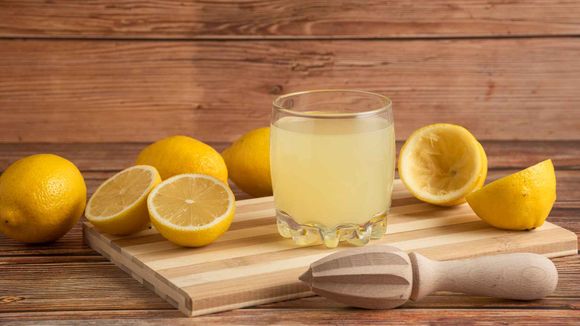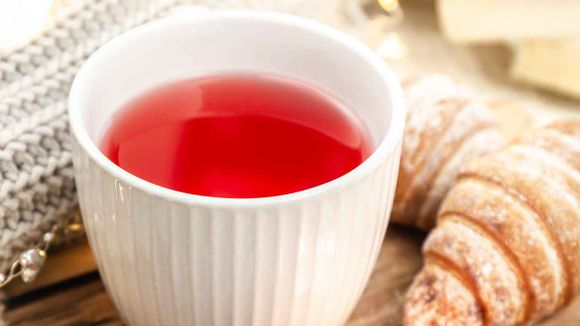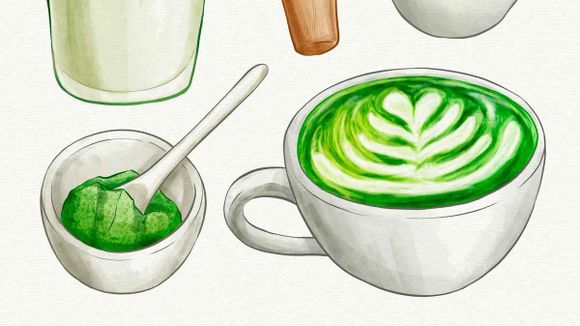8 great herbal alternatives to coffee with a tonic effect
Chicory coffee
Chicory root (Cichorium intybus) is derived from a plant with bright blue flowers, which belongs to the dandelion family. Used for centuries in culinary and traditional medicine, usually to prepare an alternative to coffee.
Just like coffee beans, chicory root can be roasted, ground and boiled to make a delicious hot drink. It has a very similar taste, but does not contain caffeine. It is also a rich source of inulin. This soluble fiber can aid digestion and keep the gut healthy by promoting the growth of beneficial bacteria especially bifidobacteria and lactobacilli.
In addition, chicory root can stimulate the liver to produce more bile, which is useful for fat digestion. [ref. 1]
Chicory root can be found commercially pre-ground and baked, so it's easy to prepare. Just boil it like in a filter coffee machine, French press or espresso machine. Use 2 tablespoons for every 180 ml. water or adjust this ratio according to your preferences.
Keep in mind that chicory root may cause digestive disorders in some people. Although inulin is great for your health, it can have side effects, such as bloating and gas.
Matcha tea
Matcha is a type of green tea prepared by steaming, drying and grinding the leaves of the Camellia sinensis plant into a fine powder. Thanks to matcha, you get a highly concentrated source of antioxidants – in particular, epigallocatechin gallate (EGCG).
Due to its unique chemical composition and valuable taste, which distinguishes it from other tea drinks, matcha tea is considered the highest quality tea. Its health properties are due to the high content of antioxidant and anti-inflammatory substances. Studies confirming the high antioxidant potential of tea drinks claim that it derives from the significant content of catechins, a type of phenolic compound with beneficial effects on human health. [ref. 1]
Here's how you can try making matcha tea:
- Sift 1–2 teaspoons of matcha powder into a ceramic bowl using a fine mesh strainer.
- Add hot but not boiling water — the water temperature should be about 71–77°C.
- Stir slowly until the powder dissolves, then stir a little more with a bamboo stirrer or a simple spoon.
- The tea is ready after a light foam is formed. You can also try adding 1 cup of steamed warm milk or a non-dairy alternative for a creamy latte with matcha tea.
Golden milk
Golden milk is a great decaffeinated coffee substitute. This hot drink includes invigorating spices such as ginger (Zingiber officinale), cinnamon (Cinnamomum verum), turmeric (Curcuma) and black pepper (Piper nigrum). Other common ingredients include cardamomum, vanilla (Vanilla planifolia) and honey.
You can prepare golden milk in about 5 minutes. Here's how:
- In a saucepan, mix 1 cup of milk or its alternative with 1/2 teaspoon ground turmeric, 1/4 teaspoon cinnamon, 1/8 teaspoon ground ginger and a pinch of pepper. If desired, add honey to taste.
- Heat the mixture over low to medium heat, stirring often so that it does not burn.
- Once heated, pour the drink into a glass and enjoy the refreshing taste.
Water with lemon

Water with lemon is a great way to start the day and boost your metabolism. It contains no calories and caffeine and provides a sufficient amount of vitamin C. As an antioxidant, vitamin C plays a role in your immune system and protects your skin from sun damage. It is essential for creating collagen, a protein that provides the basic structure for your skin, tendons, and ligaments.
Just one glass of lemon water – prepared by adding juice of half a lemon to 1 cup of water provides 10% of the recommended amount for vitamin C daily.
Yerba mate
Yerba mate is an herbal tea with a natural caffeine content made from the dried leaves of the South American llex paraguriensis tree.
If you're looking for a coffee substitute but don't want to part with your morning dose of caffeine, yerba mate can provide it for you. One cup contains approximately 78 mg of caffeine, which is similar to the caffeine content of an average cup of coffee. Yerba mate is also rich in beneficial plant compounds that act as antioxidants.
In fact, some studies have shown that it may have a higher antioxidant content than green tea. Yerba mate provides several minerals and vitamins, including riboflavin, thiamine, phosphorus, iron, calcium, and vitamins C and E. [ref. 3]
Black Tea chai
This type of tea is black tea mixed with strong herbs and spices. Although it contains less caffeine (48 mg) than coffee, studies have shown that this tea can improve mental alertness and concentration. This makes it a great alternative to coffee and is quite easy to prepare.
There are different recipes, and we will give you precise instructions:
- Crush 4 grains of cardamom, 4 grains of cloves and 2 grains of black pepper.
- In a saucepan mix 2 cups of filtered water, 3 cm slice of fresh ginger, 1 stick of cinnamon and crushed spices.
- Bring the mixture to a boil, then remove from heat.
- Add 2 sachets of black tea for one serving and let it soak for 10 minutes.
- Strain the tea into two cups and enjoy the fragrant infusion.
Rooibos tea

Rooibos is a decaffeinated drink that originated in South Africa. Unlike coffee and other teas, rooibos is low in tannin antioxidants, which can be beneficial but also interfere with iron absorption. Despite the low content of tannin, rooibos provides a significant amount of other antioxidants and has a refreshing effect.
Rooibos has a longer soaking time than most teas and excessive soaking does not produce a bitter taste. Instead, rooibos has a slightly sweet fruity taste, so if you love sweeter drinks, rooibos is for you.
To brew such tea, use a tea filter to soak 1–1.5 teaspoons of loose rooibos for up to 10 minutes. If desired, you can add lemon and honey to taste.
Kombucha
Kombucha is made by fermenting black tea with bacteria, yeast and sugar. The fermentation process creates a symbiotic colony of bacteria and yeast, commonly referred to as SCOBY. After fermentation, kombucha contains probiotics, acetic acid, and antioxidants all of which may have health benefits, including the gut and immune system. [ref. 1]
It is possible to make a homemade kombucha if you have a mother mushroom, or try a ready-made bottled drink. The taste of kombucha can be sweeter or sour depending on whether there are added ingredients - ginger, turmeric, elderberry and others. It is also a naturally carbonated drink with a very low alcohol content.








